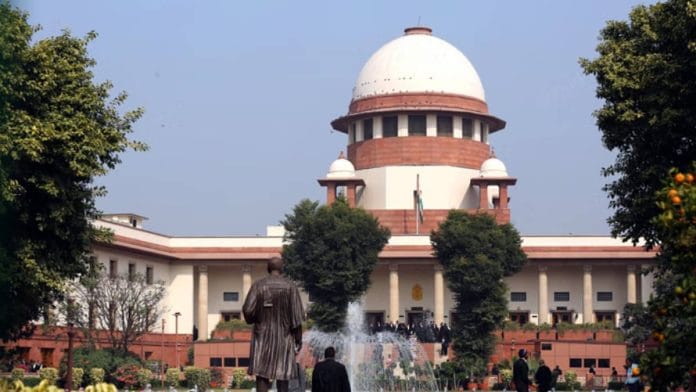New Delhi: Differing from the Lokpal’s reasoning for including high court judges within the remit of the Lokpal Act, the Centre has informed the Supreme Court that all HCs are designated as constitutional offices. Therefore, they cannot be treated as authorities or bodies established under a Parliamentary law, against which the anti-corruption watchdog can exercise its jurisdiction to order an inquiry involving a sitting judge in a graft case.
The Centre’s position on the matter was conveyed to the court through written submissions settled by Solicitor General Tushar Mehta. These were presented to a special bench of three judges, led by Justice B.R. Gavai, who is set to assume the office of Chief Justice of India in May. The other two judges are Justices Suryakant and Abhay Oka.
The special bench was constituted in January to address a reference made to the top court by the Lokpal, headed by former SC judge Justice A.M. Khanwilkar. In a judgment pronounced on 27 January, Justice Khanwilkar ruled that the high court is a body under the Lokpal Act, 2013 and, therefore, a sitting HC judge falls within the purview of the Act, making them subject to a probe upon receiving a corruption complaint.
On 20 February, the special bench took cognisance of the Lokpal’s judgment and stayed its implementation while issuing notices to the Centre and the complainant whose plea led to the Lokpal’s opinion.
On Tuesday, the three-judge bench deferred the hearing of the case, appointing senior advocate Ranjit Kumar as amicus curiae to assist the court.
Also Read: Rajasthan govt’s plea to remodel Seven Wonders Park near Ajmer lake rejected. What SC said
High courts’ constitutional status
In his submission, Mehta underscored the constitutional status of the high courts, as recognised in various Supreme Court judgments. He pointed out that their establishment is enshrined in Article 214 of the Constitution, citing multiple SC rulings that reaffirm this position.
He further argued that it is a well-established legal principle that a high court judge holds a constitutional office and cannot be considered a government employee.
Based on this, the Centre contended that the Lokpal’s decision to include a HC judge within the ambit of the term “any person” mentioned in Section 14(1)(f) of the Lokpal Act was incorrect.
“In this regard, it may be noted that the term ‘any person’, as mentioned in Section 14(1)(f) of the 2013 Act (Lokpal), must refer to a ‘chairperson’ or ‘member’ of a body, board, or corporation established by an Act of Parliament. A high court judge cannot be regarded as a ‘chairperson’ or ‘member’, nor as an officer or employee of the high court or any other body established under a Parliamentary Act,” Mehta’s submission stated.
He further argued that defining a high court as a body or authority established by an Act of Parliament would undermine its independence.
Quoting previous SC rulings, the Centre maintained that a high court judge occupies a unique position as a constitutional office-bearer. “He must be able to discharge his duties without fear or favour, affection or ill will, which would not be possible unless he remains entirely independent of the executive,” the submission stated.
Legal distinctions between constitutional & statutory bodies
The Centre’s submissions outlined the fundamental distinction between Article 214 of the Constitution, under which high courts are established, and various Acts of Parliament, which create statutory bodies, authorities, or corporations.
“It is submitted that a bare reading of these provisions clearly demonstrates a difference in the language of Parliamentary Acts when they establish bodies, boards, or authorities,” the Centre argued.
The Solicitor General’s submission also addressed the Lokpal’s reasoning for asserting jurisdiction over high courts established under state reorganisation laws, which were enacted to formally create new states such as Chhattisgarh, Uttarakhand, and Telangana.
The Centre maintained that the Lokpal’s judgment wrongly divided the existing high courts into two categories by treating the HCs of these three states differently from others.
Moreover, the provision on appointment of a high court judge in each of the three state reorganisation laws—under which these new high courts were set up—was deliberately crafted to mirror the provisions of Article 214.
This was done to ensure that the newly established high courts were recognised as constitutional bodies. The wording in these laws, the Centre said, contrasts with terminology found in Parliamentary statutes, which explicitly state: “there shall be established an authority.” Such phrasing is typically used for statutory bodies, corporations, or authorities, reinforcing that high courts are constitutionally distinct.
The Centre further criticised the inconsistency in the Lokpal’s approach, highlighting that the same Lokpal had, in a separate judgment, ruled that SC judges do not fall under its jurisdiction since the Supreme Court is established under Article 124 of the Constitution. The Centre argued that the same principle should apply to high courts as well.
By making this distinction, the Centre asserted that the Lokpal had erred in attempting to bring high court judges under its purview, as they hold a status similar to Supreme Court judges in terms of constitutional authority and independence.
(Edited by Radifah Kabir)
Also Read: Why Punjab & Haryana High Court awarded Rs 1 crore compensation to a road accident victim







Brilliant logic from Mr. Tushar Mehta.
Let’s put out such specious arguments and exempt anyone and everyone from the remit of the Lokpal. That would be of immense help in indulging in all sorts of corruption and then claiming immunity from Lokapal investigations.